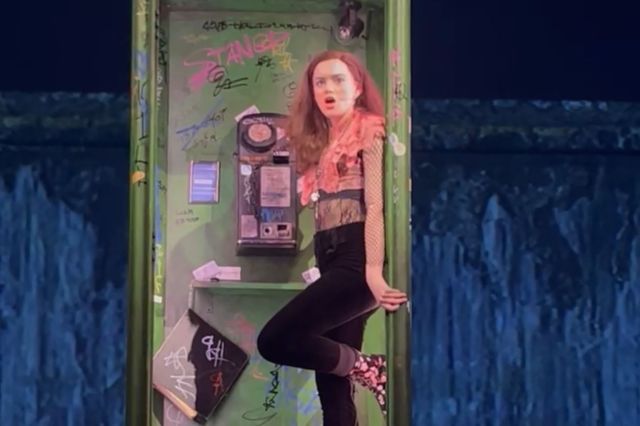Ridley joins revival ranks
You don’t have to be Scottish to tell this joke, but the accent helps: “What’s the difference between Bing Crosby and Walt Disney? Bing sings, but Walt disnae.”
When Pitchfork gets on a chair at Cosmo’s bidding, he tries to sing but only comes out with an inchoate mumble in which you can vaguely descry the words “cradle” and “heaven.” So, what’s the difference between Chris New‘s febrile Presley Stray and Cosmo’s sinister sidekick? Presley sings, but Pitchfork Disney.
It’s almost shocking how not very shocking The Pitchfork Disney now seems, exactly 21 years after its first performance at the Bush Theatre. Eat a live cockroach? You see that every day of the week on reality television. Stay home with your sister and eat chocolate? Regular practice on any housing estate. Frighten little kids in bondage gear? Yawn, yawn.
What survives unaltered, of course, is the vivacity of Ridley’s writing and the way he makes theatre of imagery, of dreams and nightmare, in a distinctive London voice. He’s as much a playwright of the East End, in his own way, as are Harold Pinter, Arnold Wesker, Bernard Kops and Steven Berkoff.
The Pitchfork Disney is just one of several plays that are coming round again this week testing my memories and reactions to their very first performances. On Monday, it was Timberlake Wertenbaker‘s Our Country’s Good. I happened to bump into Jim Broadbent, who was in the original 1988 cast, on the tube, and told him how much I still enjoyed the play. He looked glum, muttering something about how it suffered from being one of those “workshop” plays and somehow over-contrived, or so they all felt at the time.
And then at the opening of She Stoops to Conquer I told Howard Brenton how much I was looking forward to seeing Bloody Poetry (1984) again after all these years. “Let’s hope you still like it this time round,” he said, slightly fearfully, I thought. It opens at the Jermyn Street Theatre tomorrow. Brenton said how much he liked the poky little venue. I suppose it reminds him of the cramped Open Space basement on Tottenham Court Road all those years ago. (I much preferred the Open Space.)
And then, good grief, there’s Alan Ayckbourn‘s Absent Friends (1974) bouncing back at the Harold Comedy next week. That was the first Ayckbourn I ever reviewed, and a real gob-smacker it was, too, very bleak and unexpectedly abrasive, especially as Richard Briers was in the cast.
It was around this time that the Marxist playwright Trevor Griffiths said that there was simply no theatrical continuum between Ayckbourn and Brenton — ah, those were the good old days of stand-off and divisions, barricades and suspicion between the commercial and subsidised sectors.
Critics like Ronald Bryden and Irving Wardle helped to dissolve these differences. And I suspect that now even Brenton himself would probably see the merit in Ayckbourn’s mordant view of lower middle class morality in the suburbs.
What a week in the London theatre! Everyone’s been mightily cheered up by the restoration of She Stoops to Conquer at the National, one of the truly great English comedies (written, as are most great English comedies, by an Irishman); and tonight the Young Vic opens one of the masterpieces of Jacobean theatre, and one of my Desert Island dramas, Middleton and Rowley’s The Changeling.
I just hope they have a go at the whole play and don’t cop out by cutting the crucial sub-plot, as they did, somewhat pathetically, at the Southwark Playhouse at the end of last year.












